中考英语二轮语法复习 代词课件(共59张PPT)
文档属性
| 名称 | 中考英语二轮语法复习 代词课件(共59张PPT) | 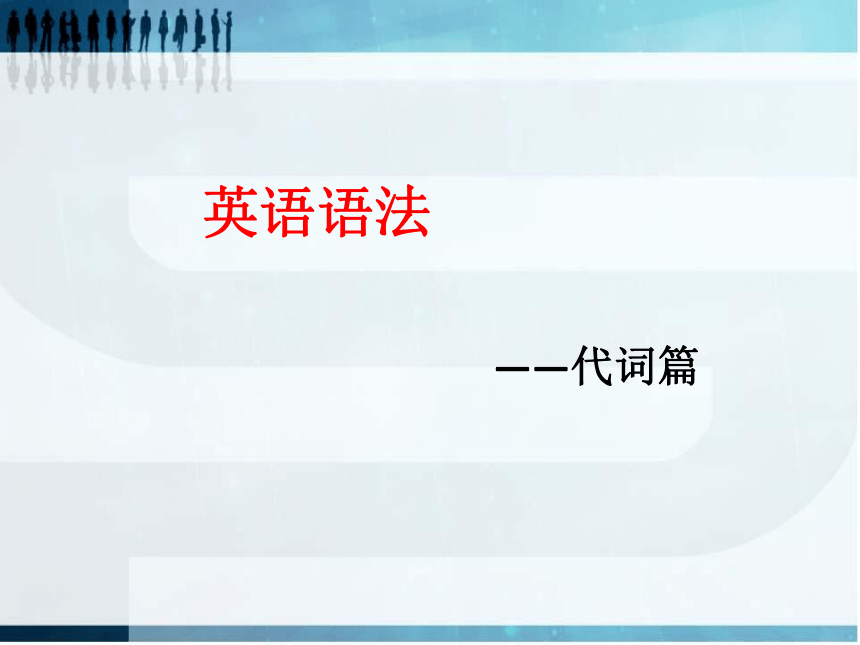 | |
| 格式 | pptx | ||
| 文件大小 | 604.2KB | ||
| 资源类型 | 教案 | ||
| 版本资源 | 通用版 | ||
| 科目 | 英语 | ||
| 更新时间 | 2023-06-23 17:28:47 | ||
图片预览


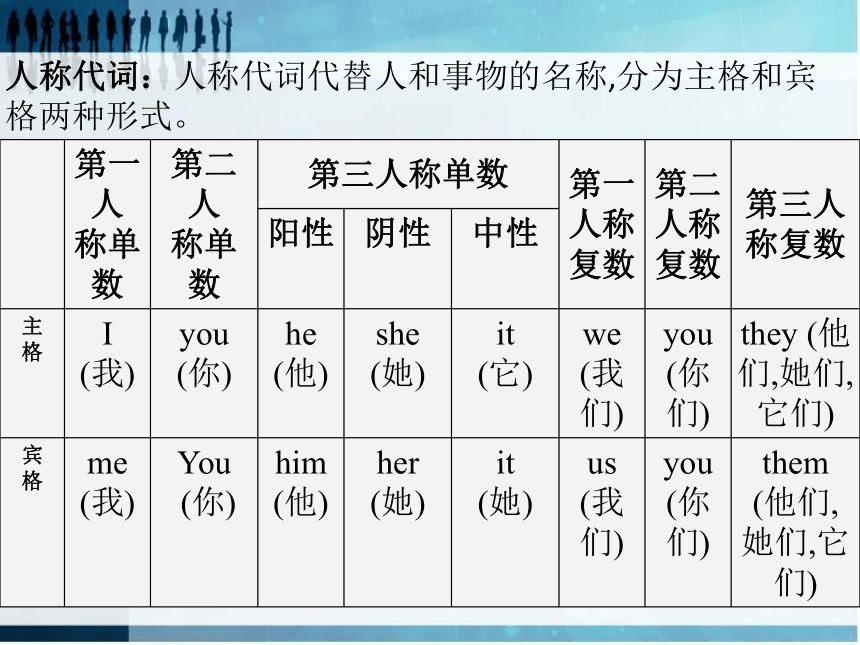
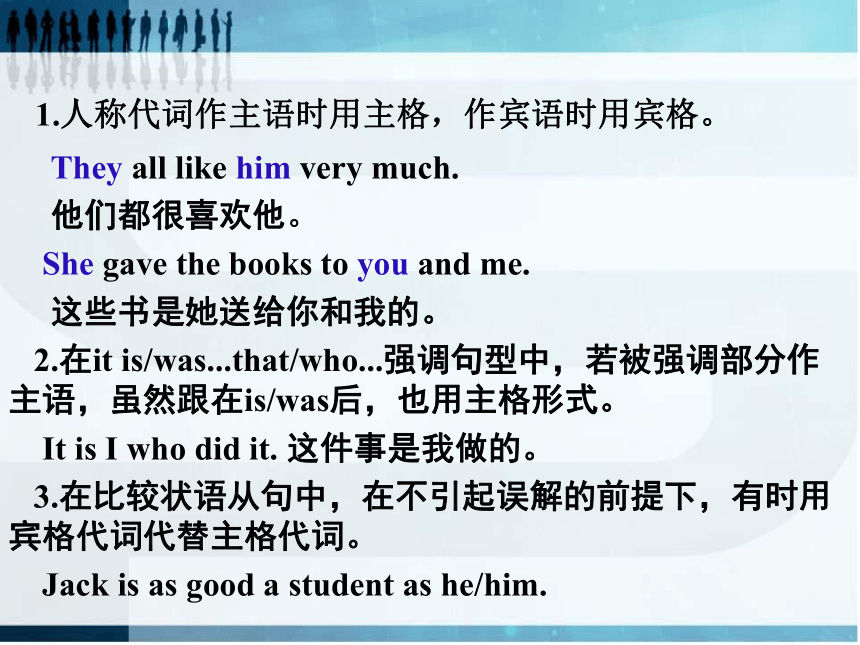

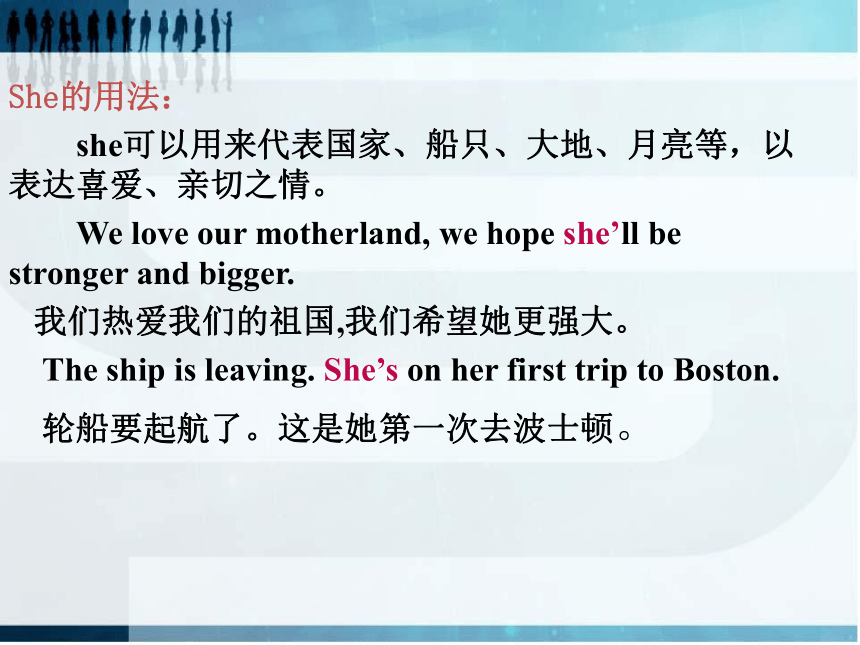
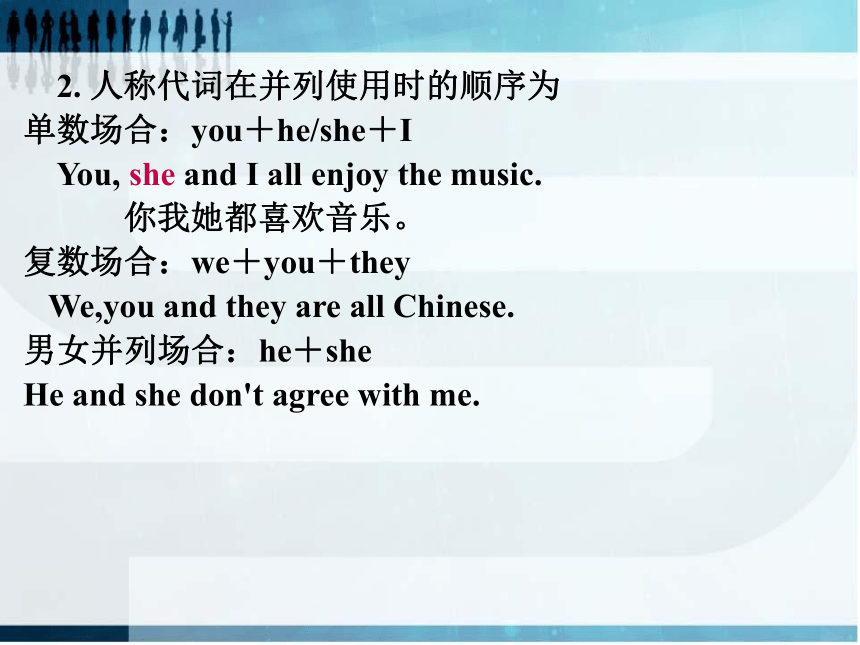
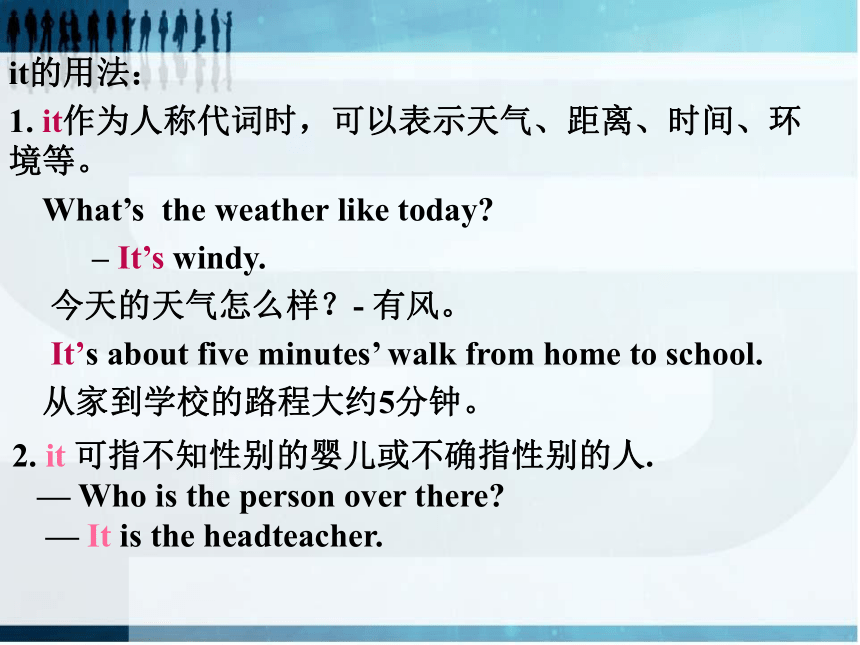
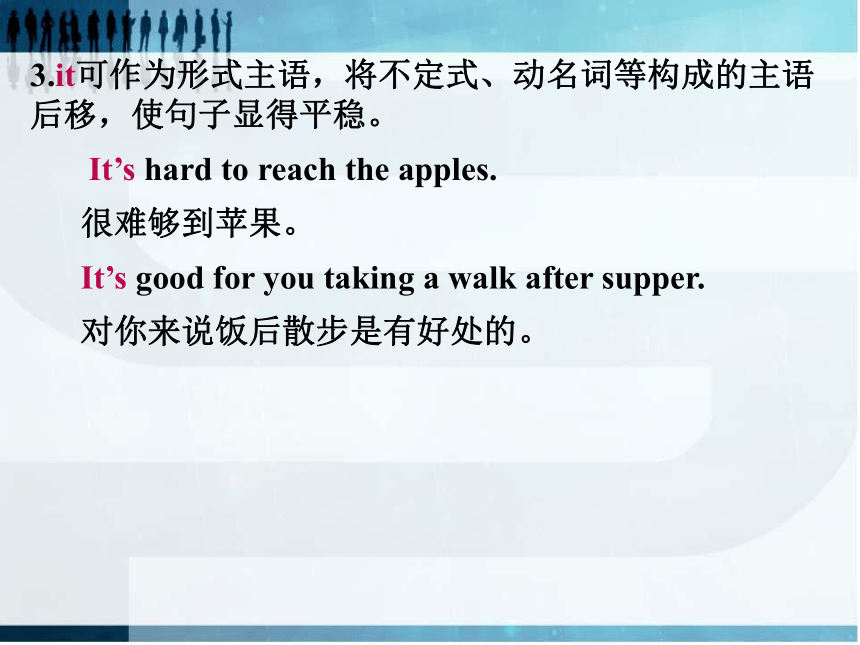
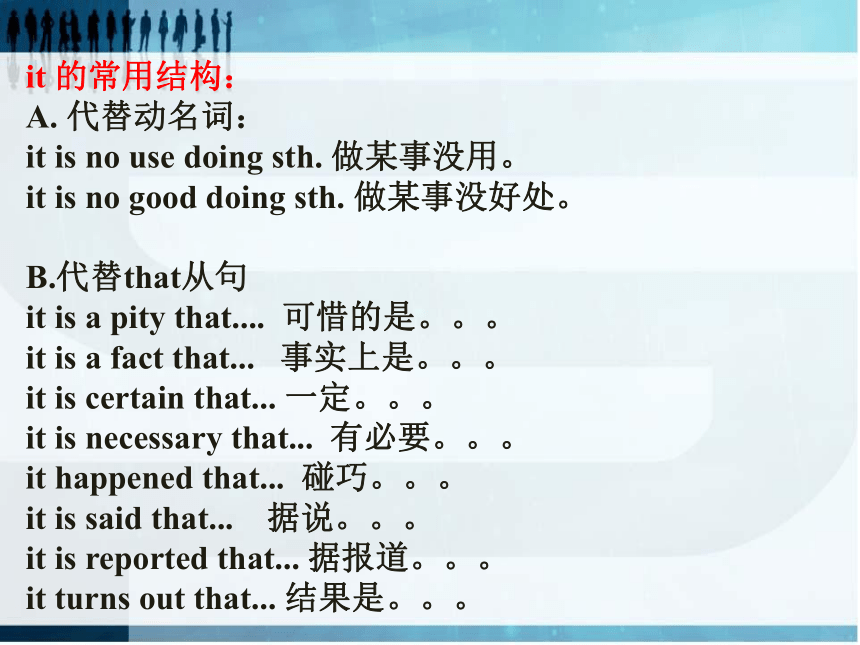
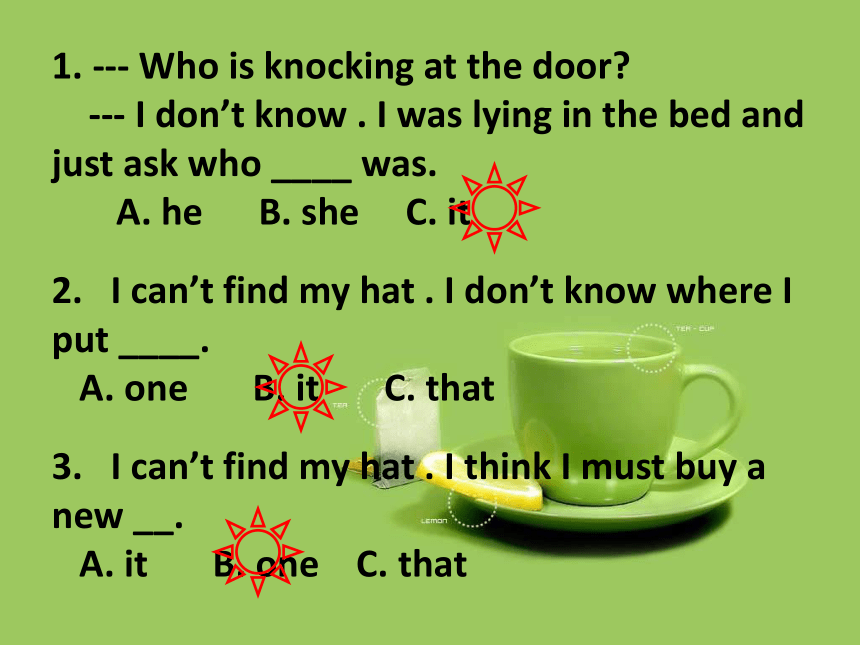

文档简介
(共59张PPT)
英语语法
——代词篇
代词的分类
人称代词
物主代词
反身代词
不定代词
指示代词
疑问代词
第一人 称单数 第二人 称单数 第三人称单数 第一人称复数 第二人称复数 第三人称复数
阳性 阴性 中性 主 格 I (我) you (你) he (他) she (她) it (它) we (我们) you (你们) they (他们,她们,它们)
宾 格 me (我) You (你) him (他) her (她) it (她) us (我们) you (你们) them (他们,她们,它们)
人称代词:人称代词代替人和事物的名称,分为主格和宾格两种形式。
1.人称代词作主语时用主格,作宾语时用宾格。
They all like him very much.
他们都很喜欢他。
She gave the books to you and me.
这些书是她送给你和我的。
2.在it is/was...that/who...强调句型中,若被强调部分作主语,虽然跟在is/was后,也用主格形式。
It is I who did it. 这件事是我做的。
3.在比较状语从句中,在不引起误解的前提下,有时用宾格代词代替主格代词。
Jack is as good a student as he/him.
若可能引起误解,就不能用宾格代替主格。
He loves you more than I. 他爱我胜过我爱你。
He loves you more than me. 他爱你胜过爱我。
4.用来表示感叹时,常用宾格形式。
Dear me! 天哪!
Goodness me! 天哪!
She的用法:
she可以用来代表国家、船只、大地、月亮等,以表达喜爱、亲切之情。
We love our motherland, we hope she’ll be stronger and bigger.
我们热爱我们的祖国,我们希望她更强大。
The ship is leaving. She’s on her first trip to Boston.
轮船要起航了。这是她第一次去波士顿。
2. 人称代词在并列使用时的顺序为
单数场合:you+he/she+I
You, she and I all enjoy the music.
你我她都喜欢音乐。
复数场合:we+you+they
We,you and they are all Chinese.
男女并列场合:he+she
He and she don't agree with me.
it的用法:
1. it作为人称代词时,可以表示天气、距离、时间、环境等。
What’s the weather like today
– It’s windy.
今天的天气怎么样?- 有风。
It’s about five minutes’ walk from home to school.
从家到学校的路程大约5分钟。
2. it 可指不知性别的婴儿或不确指性别的人.
— Who is the person over there
— It is the headteacher.
3.it可作为形式主语,将不定式、动名词等构成的主语后移,使句子显得平稳。
It’s hard to reach the apples.
很难够到苹果。
It’s good for you taking a walk after supper.
对你来说饭后散步是有好处的。
it 的常用结构:
A. 代替动名词:
it is no use doing sth. 做某事没用。
it is no good doing sth. 做某事没好处。
B.代替that从句
it is a pity that.... 可惜的是。。。
it is a fact that... 事实上是。。。
it is certain that... 一定。。。
it is necessary that... 有必要。。。
it happened that... 碰巧。。。
it is said that... 据说。。。
it is reported that... 据报道。。。
it turns out that... 结果是。。。
1. --- Who is knocking at the door
--- I don’t know . I was lying in the bed and just ask who ____ was.
A. he B. she C. it
2. I can’t find my hat . I don’t know where I put ____.
A. one B. it C. that
3. I can’t find my hat . I think I must buy a new __.
A. it B. one C. that
固定句型
1. 做某事情对某人来说是…
It is + adj. (+for sb.) +to do sth.
It is hard for me to do this work.
2. 轮到某人做…
It’s one’s turn to do sth.
It’s your turn to clean the room.
3. 是(某人)做某事的时候了
It’s time (for sb.) to do sth.
It’s time for you to do the homework.
4. 据说… It’s said that …
It’s said that your teacher leave our school.
5. 某人花费…做某事
It takes sb. some time to do sth.
6. 自从…以来,已经有…(时间)了。
It is / has been + 时段 + since + 从句(过去时)
7. 某人发现/认为/感觉到做某事是…的
find
sb. think
feel
+ it + adj. to do
I found ___ very difficult to make progress in my study .
A. it’s B. it C. that
2. It __ my father a whole month to go on business .
A. spent B. cost C. took
二.物主代词
人称 分类 第一人称 第二人称 第三人称 单数 复数 单数 复数 单数 复数
形容词性
名词性
my
our
your
your
his
her
its
their
mine
ours
yours
yours
his
hers
its
theirs
2.形容词性物主代词和名词性物主代词的关系:
形容词性物主代词+名词=名词性物主代词
注意:名词性物主代词在句中所指代的关系是单数还是复数。
These books aren't ours. Ours are new.
(our books = ours)
This is not our room. Ours is over there.
(our room = ours)
2.“of +名词性物主代词”表示所属
A sister of his is a nurse.
他的一个妹妹是个护士。
Tom is a friend of mine.
汤姆是我的一个朋友。
1. She is a friend of ________.
A. my B. mine C. I
2. This isn’t my pen ,it is _____.
A. her B. his C. him
3. Frank can’t find ____ dictionary . Can you lend ____ to _____
A. her , mine , her
B. / , yours , he
C. his , yours , him
4. ____ school is much bigger than ____.
A. Our , their
B. Ours , theirs
C. Our , theirs
5. The dog is so poor because ____ leg is badly hurt .
A. it B. its C. it’s
人称 分类 第一人称 第二人称 第三人称 单 数
复数 myself
ourselves
yourself
yourselves
himself
themselves
herself
itself
反身代词
1. 反身代词常见固定搭配
过得愉快
自学
请随便吃…
自言自语
独自
为自己
不要客气
陶醉/沉浸于
自己穿衣服
照顾自己
enjoy oneself
teach / learn oneself sth.
help oneself to sth.
say to oneself
by oneself
for oneself
make oneself at home
lose oneself in…
dress oneself
look after oneself
注意:
1) oneself 有单复数之分
* I enjoy myself.
* Children, help yourselves to some fish.
2)反身代词可以加强名词或代词的语气,一般表示“亲自,本人”的意思。
I can manage it myself. 我自己能处理。
3)反身代词的动词短语。 (P25)
The man is rich , he can buy ___ a lot of things .
A. he B. his C. himself
2. --- What a lovely card ! Where did you buy it
--- I made it by _____.
A. me B. myself C. itself
3. “Help ____ to some chicken ,”my mother said to the guests.
A. yourself B. yourselves C. your
不定代词
不明确指代某个人、某些人、某些食物的代词叫做不定代词。
all, each, every, both, either, neither
none, one, little, few, many, much
other, another, some, any, no one
由some, any, no, every 等构成的合成代词
it,one, the one, ones, the ones, that 与those的区别
it,one, the one, ones, the ones, that 与those都可以替代上文出现过的名词,但它们所指代的情况不同。
具体区别如下:
其中it通常用来指代上文提到过的那个事物,表示特指概念,即指代同一物。
I like this house with a beautiful garden in front, but I don't have enough money to buy it.
其余几个词替代上文提到的名词时不表示同一个,而是同一类。除了替代不同类型的名词外,还有泛指与特指的区别。 P28
替代不可数名词只能用that。
几组在用法上容易混淆的不定代词
1.some/any
some(一些,某)一般用于肯定句中
There are some flowers in front of the house.
any(一些,任何)多用于疑问句和否定句
Do you have any picture-books
注意:some有时也可用于表示请求、征求意见的疑问句中,希望对方给予肯定的回答或料想对方会作肯定回答。
Would you like some meat
你想要些肉吗?
May I ask some questions
我可以问问题吗?
Could I have some apples
我可以吃苹果吗?
Will you give me some water
你能给我些水吗?
2. many/much
many 修饰或指代复数名词
There are many eggs in the basket.
Many of us like playing games.
much 修饰或指代不可数名词
He doesn’t know much English.
3.another/other
another 泛指三个或三个以上中的另一个
I don’t want this coat. Please show me another.
other 后面接名词,泛指别的、其他的
Do you have any other questions
4. the other/others/the others
the other
1. 特指两个中的另一个
He has two sons. One is a worker, the other is a doctor.
2. 修饰名词,特指另一个、另一些
Tom likes swimming, and the other boys in his class like swimming, too.
others泛指其他的人或物
He often helps others.
Some are playing basketball, others are playing football.
the others 特指确定范围内剩下的全部人或物
There are fifty students in our class. Twenty of them are girls, the others are boys.
5.few/a few/little/a little
few/a few 修饰可数名词
little/a little 修饰不可数名词
few, little 表示否定意义, 译为“没有几个”,“没有多少”
a few, a little 表示肯定意义, 译为“有几个”,“有一点”
Although all the girls have tried their best , only ___ pass the exam.
A. few B. a few C. a little
2. Don’t worry .There is ____ time left .
A. little B. a little C. few
3. You are so great! ____ people in the school can do it .
A. A little B. Little C. Few
6.every/each
every+单数名词,表示“每一个”,强调共性、整体,只作定语,形式上为单数.不与of 连用
Every child likes playing games.
each 表示“每一个”,强调个性,作定语主语、宾语和同位语,常与of 连用
Each student was asked to try again.
Each of them has a nice skirt.
each every
each (常与of连用) every
两者或以上的每一个人或物 三者或以上每一个人或物
every other … 每隔… Eg: every other day 每隔一天 = every two days ① I gave them __ an apple.
A. every B. each C. each of
② There is a line of trees on ___ side of the street.
A.every B.each C.both
③ She goes shopping __ five days.
A. every B. each C. each of
④ 他隔天来这里。 He came here __________ day.
every other
7.all/none
all “(全部)都”,表示三者或三者以上,作同位语时,一般放在连系动词、助动词之后,行为动词之前 P30
We are all from Canada.
They all like English.
none “没有”,表示三者或三者以上都不,后常跟介词of(谓语动词单、复数均可)
None of us is/are afraid of dogs.
none no one
none no one
没有什么人 / 物 “没有人” 只能指人
回答 how many 问句 回答who问句
none of + 复数名词 / them 谓语用单数
① How many people are there in the room — ___.
A. None B. No one C. Lucy
② Who is in the room — ___.
A. None B. No one C. one
③ None of them ___ China.
A. come from B. is from C. is come from
8.both/either/neither
both “(两者)都”,作主语时看作复数;作定语时后跟名词复数
My parents are both teachers.
=Both of my parents are teachers.
neither “(两者)都不”,含有否定意义,作主语时谓语用第三人称单数; 作定语时后跟名词单数
Neither answer is right.
either “两者中任何一个”,作主语时谓语用第三人称单数; 作定语时后跟名词单数
There are trees on either side of the street.
= There are trees on both sides of the street.
有关词组及应用
both of/either of/neither of
Both of them swim well.
他们俩都游得很好。
Either of you goes to Beijing.
你们俩随便谁去北京都可以。
Neither of them stopped to have a rest.
他们俩谁都不停下来休息。
either of 两者之一 + 复数名词 / them / us 谓单
neither of 两者都不 谓单
both of 两者都 谓复
① ___ of the girls ___ him. They asked him for name card.
A. Neither; know
B. Either; know
C. Neither; knows
② Both of his parents ___ teachers.
A. is B. are C. was
③ Both of his brothers ___ in this hospital, but neither of them ___ a doctor.
A. works; is B. work; is C. work; are
either neither both
both…and(谓语动词用复数形式)
either…or/neither…nor(谓语动词遵循就近原则)
Both Tom and Lucy are in Grade Two.
Tom 和 Lucy 都在二年级。
Either my father or my mother cooks at home.
或者我爸爸或者我妈妈在家烧饭。
Neither he nor I am free today.
我和他今天都没空。
either neither both
① Either Tom or the twins __ the way to the shop.
A. know B. knows C. finds
② Neither you nor I ___ a scientist.
A. is B. are C. am
③ Both Tom and Mary ___ hard.
A. studies B. study C. studying
either …or … 或者…或者… 就近原则
neither …nor … 两者都不 both …and … 两者都 复数谓语
The students are all from Foshan . They ___ like their city .
A. both B. all C. either
Lucy and Lily ___ agree with us.
A. all B. both C. neither
How are your parents They are ____ fine.
A. both B. all C. no
不定代词 含义 数量关系 作定语时名词的数 作主语时动词的数
both 两者都 =2 复数 复数
either 两者中的任何一个 =2 单数 单数
neither 两者都不 =2 单数 单数
all 三者或三者以上都 ≥3 单数或复数 单数或复数
none 三者或三者以上都不 ≥3 ○ 单数或复数
each 每一个 ≥2 单数 单数
every 每一个 ≥3 单数 单数
9.something/anything/nothing
somebody/anybody/nobody
当形容词修饰这些不定代词时,常后置
I have something important to tell you.
Is there anything else in the box
Nobody can answer the question.
every, everyone, everybody, everything 与 not 连用表示部分否定,意为“并非每个.....都.....”
Every man is not honest.= Not every man is honest.
1. Do you have _____ to do this evening
A. important something
B. anything important
C. something important
2. _____ is watching TV . Let’s turn it off .
A . Somebody B. Anybody C. Nobody
3. Would you like ___ I can get it for you .
A. something else
B. anything else
C. everything else
one it
① The box is in the middle of the room. Move __ away.
A. it B. one C. /
② I have lost my pen. I have to buy ___.
A. one B. it C. /
③ How nice your bag is! I want to buy ___.
A. it B. one C. /
one 同类不同件.
it 同类同件.
指示代词
表示空间和时间远近关系的代词 包括:this/that (单数) these/those (复数)
1. this,these指在方位上较近的人或物
that,those指在方位上较远的人或物
This is my shirt, that’s yours.
These TVs are made in China,
Those are made in Japan.
2.that,those常指前面提过的东西,以免重复
*These boxes are heavier than those on the desk.
3.刚才提到的事情,在英文中用that
*He was ill yesterday. I’m sorry to hear that.
四.指示代词
① The population of Shanghai is larger than __ of Jinan.
A. that B. this C. it
② The radios made in Beijing are as good as ___ made in Qingdao.
A. that B. these C. those
③ What I want to tell you is ___the film will be at eight.
A. it B. this C. that
疑问代词
用来构成特殊疑问句的代词
常见有:who whom whose what which 通常做主语\宾语\定语\表语
What makes you think like that \做主语\
Who (Whom) were you talking with \做宾语\
Which bus do I need \做定语\
What’s your father \做表语\
注意:在口语中,Who和Whom通用, 但在介词后只能用Whom
With whom did he play games
With who did he play games (错)
Try it out
( )1 Is this your football, boys
No, it is not ____
A. yours B. our C. mine D. ours
( )2 The bird builds ____ nest in the tree.
A. her B. its C. it’s D. hers
( )3 The maths problem ____ is wrong.
A. himself B. he C. itself D. herself
D
B
C
( )4 I have five pencils, one is red, ____ is blue and ___ are green.
A. another, the other B. the other, others
C. others, the others D. another, the others
( ) 5 I have found ____ on the Internet.
A. a few informations B. a little informations
C. a few information D. a little information
D
D
( ) 6 I have Chemistry classes ____ day, Monday, Wednesday and Friday.
A. each other B. every other
C. this and other D. all other
( )7 -- ____ is the man under the tree
-- Jim’s father.
A. When B. What C. Where D. Who
B
D
课堂达标
11. This stick is ____.
A. him B. he C. his
12. He is always ready to help ____.
A. another B. the other C. others
13. ______ is Jack’s aunt.
A. He B. She C. It
14. She sent several cards to ____ of her friends.
A. some B. any C. no
15. _____ subjects do you have this term
A. Which B. Whose C. What
16. _____ of them has a computer.
A. Each B. Every C. All
17. Can your brother look after _____
A. himself B. him C. his
8 Which of _____ bikes is yours
A. this B. that C. these
19. _____ are good friends.
A. You, he and I B. She, you and I
C. I, you and he
20. She hasn’t brought _____ pen today. Will you
lend her _____
A. her, your B. hers, yours C. her, yours
21. Very _____ of them knew the hotel.
A. few B. little C. a few
22. The jacket is too short. Please show me ____.
A. other B. another C. one
23. Some city people grow vegetables _____.
A. herself B. himself C. themselves
用恰当的词填空。
I am a student. _____ name is Lily. I
often teach ________ English.
2. Tom is too young. Please look after
________.
3. He is fourteen. _____ name is Tom. This
book is ____. He can look after _______.
4. We’ll go fishing later. Would you like to
come with ______
5. Looking at the boys. _____ are playing
games. _______ names are Mike and
Bill. They enjoy ____________.
My
myself
him
His
his
himself
us
They
Their
themselves
英语语法
——代词篇
代词的分类
人称代词
物主代词
反身代词
不定代词
指示代词
疑问代词
第一人 称单数 第二人 称单数 第三人称单数 第一人称复数 第二人称复数 第三人称复数
阳性 阴性 中性 主 格 I (我) you (你) he (他) she (她) it (它) we (我们) you (你们) they (他们,她们,它们)
宾 格 me (我) You (你) him (他) her (她) it (她) us (我们) you (你们) them (他们,她们,它们)
人称代词:人称代词代替人和事物的名称,分为主格和宾格两种形式。
1.人称代词作主语时用主格,作宾语时用宾格。
They all like him very much.
他们都很喜欢他。
She gave the books to you and me.
这些书是她送给你和我的。
2.在it is/was...that/who...强调句型中,若被强调部分作主语,虽然跟在is/was后,也用主格形式。
It is I who did it. 这件事是我做的。
3.在比较状语从句中,在不引起误解的前提下,有时用宾格代词代替主格代词。
Jack is as good a student as he/him.
若可能引起误解,就不能用宾格代替主格。
He loves you more than I. 他爱我胜过我爱你。
He loves you more than me. 他爱你胜过爱我。
4.用来表示感叹时,常用宾格形式。
Dear me! 天哪!
Goodness me! 天哪!
She的用法:
she可以用来代表国家、船只、大地、月亮等,以表达喜爱、亲切之情。
We love our motherland, we hope she’ll be stronger and bigger.
我们热爱我们的祖国,我们希望她更强大。
The ship is leaving. She’s on her first trip to Boston.
轮船要起航了。这是她第一次去波士顿。
2. 人称代词在并列使用时的顺序为
单数场合:you+he/she+I
You, she and I all enjoy the music.
你我她都喜欢音乐。
复数场合:we+you+they
We,you and they are all Chinese.
男女并列场合:he+she
He and she don't agree with me.
it的用法:
1. it作为人称代词时,可以表示天气、距离、时间、环境等。
What’s the weather like today
– It’s windy.
今天的天气怎么样?- 有风。
It’s about five minutes’ walk from home to school.
从家到学校的路程大约5分钟。
2. it 可指不知性别的婴儿或不确指性别的人.
— Who is the person over there
— It is the headteacher.
3.it可作为形式主语,将不定式、动名词等构成的主语后移,使句子显得平稳。
It’s hard to reach the apples.
很难够到苹果。
It’s good for you taking a walk after supper.
对你来说饭后散步是有好处的。
it 的常用结构:
A. 代替动名词:
it is no use doing sth. 做某事没用。
it is no good doing sth. 做某事没好处。
B.代替that从句
it is a pity that.... 可惜的是。。。
it is a fact that... 事实上是。。。
it is certain that... 一定。。。
it is necessary that... 有必要。。。
it happened that... 碰巧。。。
it is said that... 据说。。。
it is reported that... 据报道。。。
it turns out that... 结果是。。。
1. --- Who is knocking at the door
--- I don’t know . I was lying in the bed and just ask who ____ was.
A. he B. she C. it
2. I can’t find my hat . I don’t know where I put ____.
A. one B. it C. that
3. I can’t find my hat . I think I must buy a new __.
A. it B. one C. that
固定句型
1. 做某事情对某人来说是…
It is + adj. (+for sb.) +to do sth.
It is hard for me to do this work.
2. 轮到某人做…
It’s one’s turn to do sth.
It’s your turn to clean the room.
3. 是(某人)做某事的时候了
It’s time (for sb.) to do sth.
It’s time for you to do the homework.
4. 据说… It’s said that …
It’s said that your teacher leave our school.
5. 某人花费…做某事
It takes sb. some time to do sth.
6. 自从…以来,已经有…(时间)了。
It is / has been + 时段 + since + 从句(过去时)
7. 某人发现/认为/感觉到做某事是…的
find
sb. think
feel
+ it + adj. to do
I found ___ very difficult to make progress in my study .
A. it’s B. it C. that
2. It __ my father a whole month to go on business .
A. spent B. cost C. took
二.物主代词
人称 分类 第一人称 第二人称 第三人称 单数 复数 单数 复数 单数 复数
形容词性
名词性
my
our
your
your
his
her
its
their
mine
ours
yours
yours
his
hers
its
theirs
2.形容词性物主代词和名词性物主代词的关系:
形容词性物主代词+名词=名词性物主代词
注意:名词性物主代词在句中所指代的关系是单数还是复数。
These books aren't ours. Ours are new.
(our books = ours)
This is not our room. Ours is over there.
(our room = ours)
2.“of +名词性物主代词”表示所属
A sister of his is a nurse.
他的一个妹妹是个护士。
Tom is a friend of mine.
汤姆是我的一个朋友。
1. She is a friend of ________.
A. my B. mine C. I
2. This isn’t my pen ,it is _____.
A. her B. his C. him
3. Frank can’t find ____ dictionary . Can you lend ____ to _____
A. her , mine , her
B. / , yours , he
C. his , yours , him
4. ____ school is much bigger than ____.
A. Our , their
B. Ours , theirs
C. Our , theirs
5. The dog is so poor because ____ leg is badly hurt .
A. it B. its C. it’s
人称 分类 第一人称 第二人称 第三人称 单 数
复数 myself
ourselves
yourself
yourselves
himself
themselves
herself
itself
反身代词
1. 反身代词常见固定搭配
过得愉快
自学
请随便吃…
自言自语
独自
为自己
不要客气
陶醉/沉浸于
自己穿衣服
照顾自己
enjoy oneself
teach / learn oneself sth.
help oneself to sth.
say to oneself
by oneself
for oneself
make oneself at home
lose oneself in…
dress oneself
look after oneself
注意:
1) oneself 有单复数之分
* I enjoy myself.
* Children, help yourselves to some fish.
2)反身代词可以加强名词或代词的语气,一般表示“亲自,本人”的意思。
I can manage it myself. 我自己能处理。
3)反身代词的动词短语。 (P25)
The man is rich , he can buy ___ a lot of things .
A. he B. his C. himself
2. --- What a lovely card ! Where did you buy it
--- I made it by _____.
A. me B. myself C. itself
3. “Help ____ to some chicken ,”my mother said to the guests.
A. yourself B. yourselves C. your
不定代词
不明确指代某个人、某些人、某些食物的代词叫做不定代词。
all, each, every, both, either, neither
none, one, little, few, many, much
other, another, some, any, no one
由some, any, no, every 等构成的合成代词
it,one, the one, ones, the ones, that 与those的区别
it,one, the one, ones, the ones, that 与those都可以替代上文出现过的名词,但它们所指代的情况不同。
具体区别如下:
其中it通常用来指代上文提到过的那个事物,表示特指概念,即指代同一物。
I like this house with a beautiful garden in front, but I don't have enough money to buy it.
其余几个词替代上文提到的名词时不表示同一个,而是同一类。除了替代不同类型的名词外,还有泛指与特指的区别。 P28
替代不可数名词只能用that。
几组在用法上容易混淆的不定代词
1.some/any
some(一些,某)一般用于肯定句中
There are some flowers in front of the house.
any(一些,任何)多用于疑问句和否定句
Do you have any picture-books
注意:some有时也可用于表示请求、征求意见的疑问句中,希望对方给予肯定的回答或料想对方会作肯定回答。
Would you like some meat
你想要些肉吗?
May I ask some questions
我可以问问题吗?
Could I have some apples
我可以吃苹果吗?
Will you give me some water
你能给我些水吗?
2. many/much
many 修饰或指代复数名词
There are many eggs in the basket.
Many of us like playing games.
much 修饰或指代不可数名词
He doesn’t know much English.
3.another/other
another 泛指三个或三个以上中的另一个
I don’t want this coat. Please show me another.
other 后面接名词,泛指别的、其他的
Do you have any other questions
4. the other/others/the others
the other
1. 特指两个中的另一个
He has two sons. One is a worker, the other is a doctor.
2. 修饰名词,特指另一个、另一些
Tom likes swimming, and the other boys in his class like swimming, too.
others泛指其他的人或物
He often helps others.
Some are playing basketball, others are playing football.
the others 特指确定范围内剩下的全部人或物
There are fifty students in our class. Twenty of them are girls, the others are boys.
5.few/a few/little/a little
few/a few 修饰可数名词
little/a little 修饰不可数名词
few, little 表示否定意义, 译为“没有几个”,“没有多少”
a few, a little 表示肯定意义, 译为“有几个”,“有一点”
Although all the girls have tried their best , only ___ pass the exam.
A. few B. a few C. a little
2. Don’t worry .There is ____ time left .
A. little B. a little C. few
3. You are so great! ____ people in the school can do it .
A. A little B. Little C. Few
6.every/each
every+单数名词,表示“每一个”,强调共性、整体,只作定语,形式上为单数.不与of 连用
Every child likes playing games.
each 表示“每一个”,强调个性,作定语主语、宾语和同位语,常与of 连用
Each student was asked to try again.
Each of them has a nice skirt.
each every
each (常与of连用) every
两者或以上的每一个人或物 三者或以上每一个人或物
every other … 每隔… Eg: every other day 每隔一天 = every two days ① I gave them __ an apple.
A. every B. each C. each of
② There is a line of trees on ___ side of the street.
A.every B.each C.both
③ She goes shopping __ five days.
A. every B. each C. each of
④ 他隔天来这里。 He came here __________ day.
every other
7.all/none
all “(全部)都”,表示三者或三者以上,作同位语时,一般放在连系动词、助动词之后,行为动词之前 P30
We are all from Canada.
They all like English.
none “没有”,表示三者或三者以上都不,后常跟介词of(谓语动词单、复数均可)
None of us is/are afraid of dogs.
none no one
none no one
没有什么人 / 物 “没有人” 只能指人
回答 how many 问句 回答who问句
none of + 复数名词 / them 谓语用单数
① How many people are there in the room — ___.
A. None B. No one C. Lucy
② Who is in the room — ___.
A. None B. No one C. one
③ None of them ___ China.
A. come from B. is from C. is come from
8.both/either/neither
both “(两者)都”,作主语时看作复数;作定语时后跟名词复数
My parents are both teachers.
=Both of my parents are teachers.
neither “(两者)都不”,含有否定意义,作主语时谓语用第三人称单数; 作定语时后跟名词单数
Neither answer is right.
either “两者中任何一个”,作主语时谓语用第三人称单数; 作定语时后跟名词单数
There are trees on either side of the street.
= There are trees on both sides of the street.
有关词组及应用
both of/either of/neither of
Both of them swim well.
他们俩都游得很好。
Either of you goes to Beijing.
你们俩随便谁去北京都可以。
Neither of them stopped to have a rest.
他们俩谁都不停下来休息。
either of 两者之一 + 复数名词 / them / us 谓单
neither of 两者都不 谓单
both of 两者都 谓复
① ___ of the girls ___ him. They asked him for name card.
A. Neither; know
B. Either; know
C. Neither; knows
② Both of his parents ___ teachers.
A. is B. are C. was
③ Both of his brothers ___ in this hospital, but neither of them ___ a doctor.
A. works; is B. work; is C. work; are
either neither both
both…and(谓语动词用复数形式)
either…or/neither…nor(谓语动词遵循就近原则)
Both Tom and Lucy are in Grade Two.
Tom 和 Lucy 都在二年级。
Either my father or my mother cooks at home.
或者我爸爸或者我妈妈在家烧饭。
Neither he nor I am free today.
我和他今天都没空。
either neither both
① Either Tom or the twins __ the way to the shop.
A. know B. knows C. finds
② Neither you nor I ___ a scientist.
A. is B. are C. am
③ Both Tom and Mary ___ hard.
A. studies B. study C. studying
either …or … 或者…或者… 就近原则
neither …nor … 两者都不 both …and … 两者都 复数谓语
The students are all from Foshan . They ___ like their city .
A. both B. all C. either
Lucy and Lily ___ agree with us.
A. all B. both C. neither
How are your parents They are ____ fine.
A. both B. all C. no
不定代词 含义 数量关系 作定语时名词的数 作主语时动词的数
both 两者都 =2 复数 复数
either 两者中的任何一个 =2 单数 单数
neither 两者都不 =2 单数 单数
all 三者或三者以上都 ≥3 单数或复数 单数或复数
none 三者或三者以上都不 ≥3 ○ 单数或复数
each 每一个 ≥2 单数 单数
every 每一个 ≥3 单数 单数
9.something/anything/nothing
somebody/anybody/nobody
当形容词修饰这些不定代词时,常后置
I have something important to tell you.
Is there anything else in the box
Nobody can answer the question.
every, everyone, everybody, everything 与 not 连用表示部分否定,意为“并非每个.....都.....”
Every man is not honest.= Not every man is honest.
1. Do you have _____ to do this evening
A. important something
B. anything important
C. something important
2. _____ is watching TV . Let’s turn it off .
A . Somebody B. Anybody C. Nobody
3. Would you like ___ I can get it for you .
A. something else
B. anything else
C. everything else
one it
① The box is in the middle of the room. Move __ away.
A. it B. one C. /
② I have lost my pen. I have to buy ___.
A. one B. it C. /
③ How nice your bag is! I want to buy ___.
A. it B. one C. /
one 同类不同件.
it 同类同件.
指示代词
表示空间和时间远近关系的代词 包括:this/that (单数) these/those (复数)
1. this,these指在方位上较近的人或物
that,those指在方位上较远的人或物
This is my shirt, that’s yours.
These TVs are made in China,
Those are made in Japan.
2.that,those常指前面提过的东西,以免重复
*These boxes are heavier than those on the desk.
3.刚才提到的事情,在英文中用that
*He was ill yesterday. I’m sorry to hear that.
四.指示代词
① The population of Shanghai is larger than __ of Jinan.
A. that B. this C. it
② The radios made in Beijing are as good as ___ made in Qingdao.
A. that B. these C. those
③ What I want to tell you is ___the film will be at eight.
A. it B. this C. that
疑问代词
用来构成特殊疑问句的代词
常见有:who whom whose what which 通常做主语\宾语\定语\表语
What makes you think like that \做主语\
Who (Whom) were you talking with \做宾语\
Which bus do I need \做定语\
What’s your father \做表语\
注意:在口语中,Who和Whom通用, 但在介词后只能用Whom
With whom did he play games
With who did he play games (错)
Try it out
( )1 Is this your football, boys
No, it is not ____
A. yours B. our C. mine D. ours
( )2 The bird builds ____ nest in the tree.
A. her B. its C. it’s D. hers
( )3 The maths problem ____ is wrong.
A. himself B. he C. itself D. herself
D
B
C
( )4 I have five pencils, one is red, ____ is blue and ___ are green.
A. another, the other B. the other, others
C. others, the others D. another, the others
( ) 5 I have found ____ on the Internet.
A. a few informations B. a little informations
C. a few information D. a little information
D
D
( ) 6 I have Chemistry classes ____ day, Monday, Wednesday and Friday.
A. each other B. every other
C. this and other D. all other
( )7 -- ____ is the man under the tree
-- Jim’s father.
A. When B. What C. Where D. Who
B
D
课堂达标
11. This stick is ____.
A. him B. he C. his
12. He is always ready to help ____.
A. another B. the other C. others
13. ______ is Jack’s aunt.
A. He B. She C. It
14. She sent several cards to ____ of her friends.
A. some B. any C. no
15. _____ subjects do you have this term
A. Which B. Whose C. What
16. _____ of them has a computer.
A. Each B. Every C. All
17. Can your brother look after _____
A. himself B. him C. his
8 Which of _____ bikes is yours
A. this B. that C. these
19. _____ are good friends.
A. You, he and I B. She, you and I
C. I, you and he
20. She hasn’t brought _____ pen today. Will you
lend her _____
A. her, your B. hers, yours C. her, yours
21. Very _____ of them knew the hotel.
A. few B. little C. a few
22. The jacket is too short. Please show me ____.
A. other B. another C. one
23. Some city people grow vegetables _____.
A. herself B. himself C. themselves
用恰当的词填空。
I am a student. _____ name is Lily. I
often teach ________ English.
2. Tom is too young. Please look after
________.
3. He is fourteen. _____ name is Tom. This
book is ____. He can look after _______.
4. We’ll go fishing later. Would you like to
come with ______
5. Looking at the boys. _____ are playing
games. _______ names are Mike and
Bill. They enjoy ____________.
My
myself
him
His
his
himself
us
They
Their
themselves
同课章节目录
- 词法
- 名词
- 动词和动词短语
- 动词语态
- 动词时态
- 助动词和情态动词
- 非谓语动词
- 冠词
- 代词
- 数词和量词
- 形容词副词及其比较等级
- 介词和介词短语
- 连词和感叹词
- 构词法
- 相似、相近词比较
- 句法
- 陈述句
- 一般疑问句和否定疑问句
- 特殊疑问句及选择疑问句
- 反意疑问句
- 存在句(There be句型)
- 宾语从句
- 定语从句
- 状语从句
- 主谓一致问题
- 简单句
- 并列句
- 复合句
- 主谓一致
- 主、表语从句
- 名词性从句
- 直接引语和间接引语
- 虚拟语气
- 感叹句
- 强调句
- 倒装句
- 祈使句
- 句子的成分
- 句子的分类
- 题型专区
- 单项选择部分
- 易错题
- 完形填空
- 阅读理解
- 词汇练习
- 听说训练
- 句型转换
- 补全对话
- 短文改错
- 翻译
- 书面表达
- 任务型阅读
- 语法填空
- 其他资料
